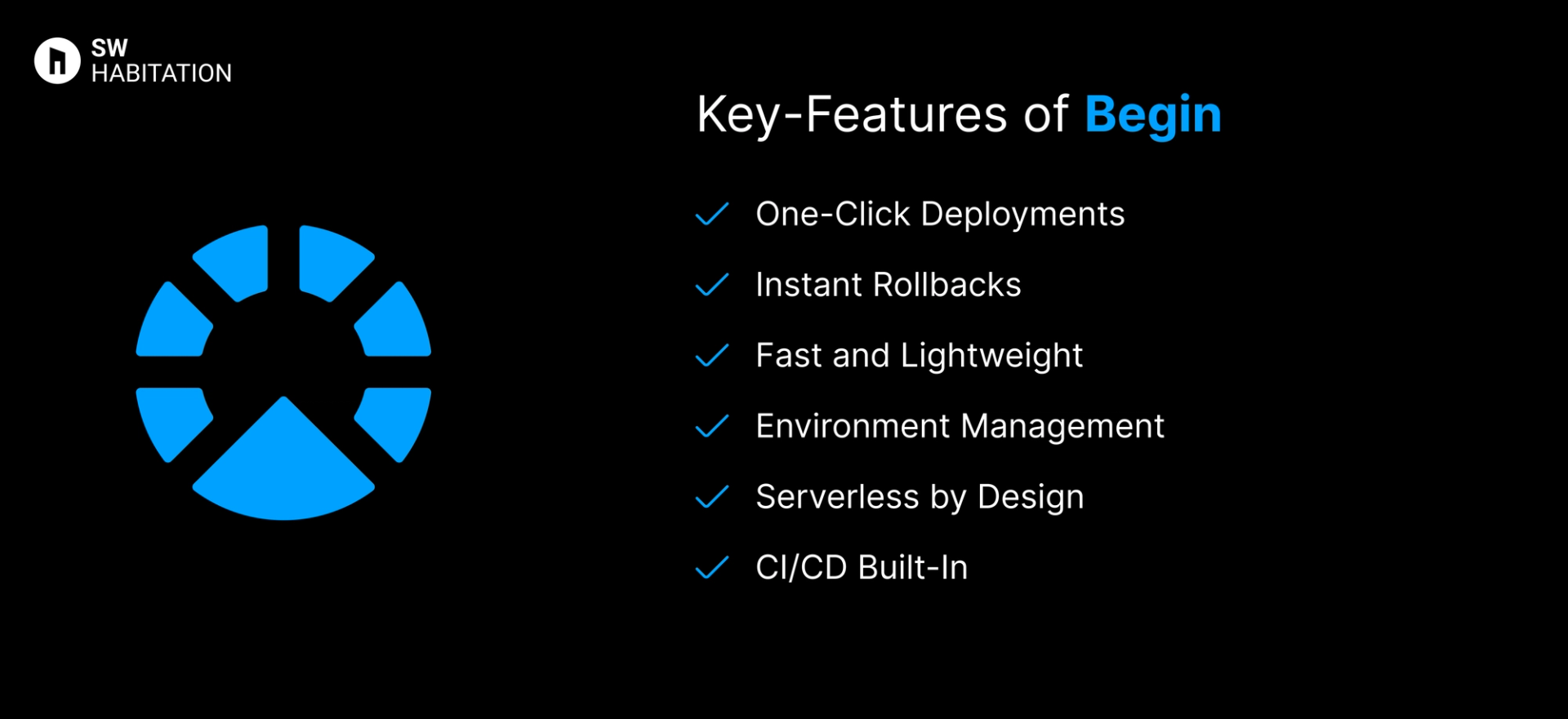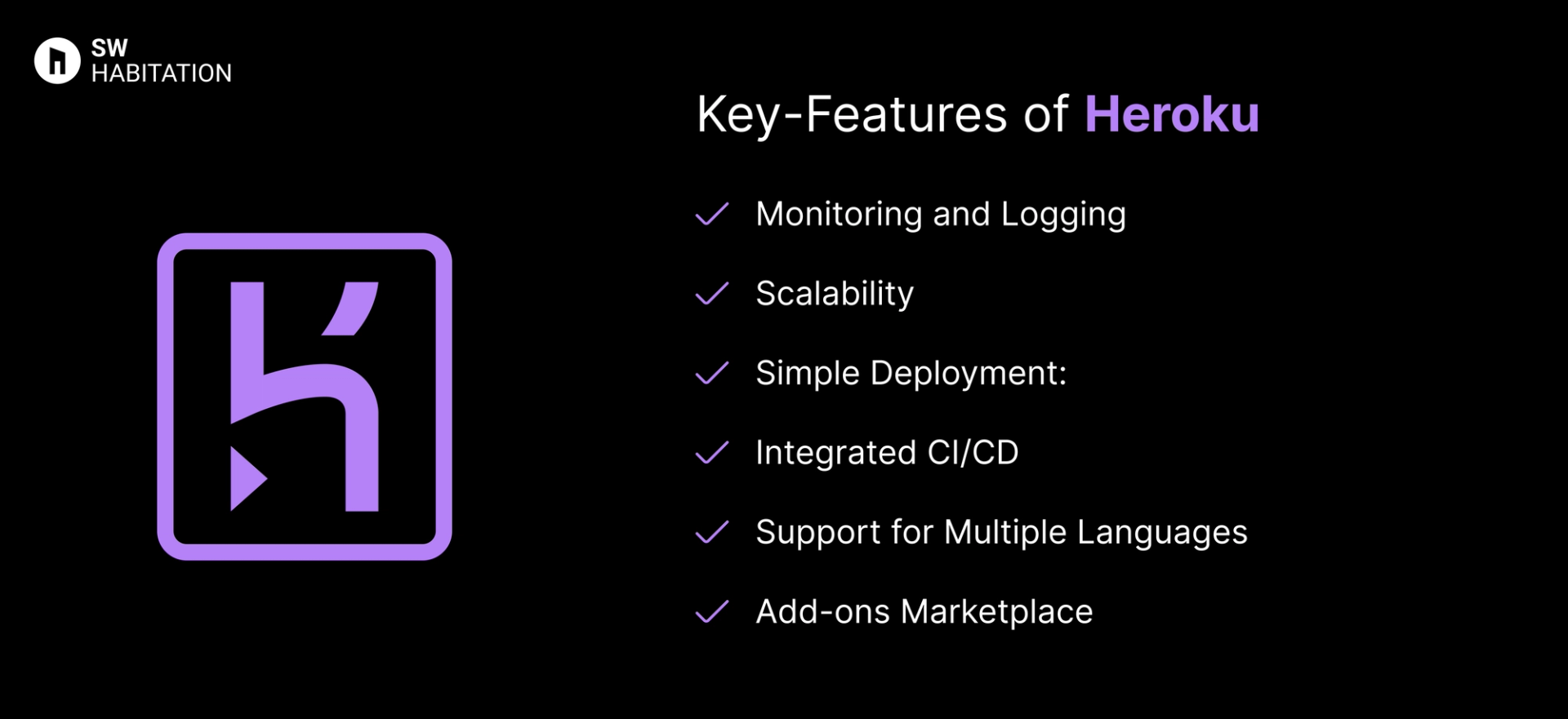Begin vs. Heroku

Begin

Heroku
You know when you’ve finished building your website and just want to get it online without dealing with all the techy stuff? That’s where deployment platforms help. They make it super easy to put your site live, just connect your code, click a button, and it’s up and running. No need to worry about servers or complicated setups.
They also take care of the important things like speed, security, and updates in the background. So while they handle the heavy stuff, you can focus on making your website look good and work great. It's simple, right?
What is Begin?
Begin is a serverless deployment platform that focuses on simplicity and speed. It’s built on top of Architect, a framework for building serverless applications on AWS. Begin abstracts away the complexities of AWS, letting developers focus on writing code and shipping features. It’s particularly popular for deploying JAMstack apps, APIs, and other serverless projects.
Key Features of Begin


- One-Click Deployments: Push to GitHub, and Begin takes care of the rest.
- Instant Rollbacks: Easily roll back to previous versions if needed.
- Fast and Lightweight: Minimal configuration required, optimized for quick deployments.
- Environment Management: Separate environments for development, staging, and production.
- Serverless by Design: Built on AWS Lambda, making scaling automatic.
- CI/CD Built-In: Every GitHub push triggers a deployment automatically.
Advantages of Begin
- Instant Rollbacks: Fix mistakes fast with one-click rollbacks.
- Environment Management: Separate dev, staging, and production environments keep things organized.
- Built-in CI/CD: No extra setup — every GitHub push deploys automatically.
- Serverless Scaling: No need to manage servers; Begin handles it with AWS Lambda.
- Super Simple Deployment: Push to GitHub, and your app goes live.
Disadvantages of Begin
- Less Flexibility for Large Apps: Great for small to medium projects, but large-scale apps might need more control.
- Small Community: Not as widely adopted as platforms like Vercel or Netlify, so finding resources and community support can be tricky.
- Tied to AWS: Under the hood, it uses AWS — so if you’re not a fan, this might not be for you.
- Limited Customization: Advanced users might feel restricted by the simplicity.
What is Heroku ?
Heroku is a cloud platform that allows developers to build, run, and operate applications entirely in the cloud. It abstracts away infrastructure complexities, providing a platform-as-a-service (PaaS) solution for deploying apps with just a few commands. From simple web apps to complex backend services, Heroku handles the heavy lifting.
Key Features of Heroku


- Monitoring and Logging: Built-in tools for app health and performance monitoring.
- Scalability: Scale apps effortlessly with dynos (Heroku’s unit of computing power).
- Simple Deployment: Deploy directly from GitHub, Git, or CLI.
- Integrated CI/CD: Continuous integration and delivery pipelines.
- Support for Multiple Languages: Node.js, Python, Ruby, Java, Go, and more.
- Add-ons Marketplace: Extend functionality with databases, monitoring, and more.
Advantages of Heroku
- Free Tier: Great for small projects and learning.
- Easy to Use: Push your code and let Heroku handle the rest.
- Add-ons Marketplace: Access to a rich ecosystem of tools and services.
- Multi-Language Support: Deploy apps in multiple programming languages.
- Scalability: Easily scale up as your app grows.
Disadvantages of Heroku
- Performance: Not ideal for performance-heavy apps at scale.
- Cost Can Add Up: Scaling beyond the free tier gets expensive.
- Limited Customization: Less control over the infrastructure.
- Cold Starts: Apps on the free tier may sleep after inactivity, causing delays.
Comparison Between Begin vs Heroku
Use Cases of Begin
- Continuous Deployment: Automatic deployments from GitHub keep your workflow smooth.
- Serverless Apps: Built-in support for AWS Lambda makes it a breeze for serverless backends.
- Quick Prototyping: Rapid deployments make it ideal for trying out new ideas or building MVPs.
- JAMstack Projects: Perfect for deploying static sites with dynamic content via APIs.
Use Cases of Heroku
- Hackathons and Learning: Great for rapid development and experimentation.
- Polyglot Projects: Supports multiple programming languages in one platform.
- Startups and Small Businesses: Deploy fast without worrying about infrastructure.
- Prototyping and MVPs: Quickly test ideas with minimal setup.
Other Resources
Conclusion
Deployment platforms are a total game changer if you’re looking to launch your website quickly, reliably, and without any trouble. Whether it’s a personal portfolio, a startup site, or a growing business platform, they handle the technical heavy lifting like hosting, security, and scalability so you can stay focused on building great experiences for your users.
You’re not boxed into a single approach. Most platforms integrate smoothly with the tools and frameworks you already love, letting you deploy directly from your Git repository, preview updates, and roll back with ease. With lightning-fast performance and dependable uptime, deployment platforms simplify the path from code to production. Pick the one that aligns with your workflow, and you’re all set to launch with confidence 🚀
Frequently asked questions
Is Begin good for teams?
Yes, Begin supports team workflows, environments (staging, production), and easy collaboration right out of the box.
Can I use custom domains with Begin?
Custom domains with SSL are built-in, no extra config needed.
Does Begin use AWS under the hood?
Yes, Begin runs on AWS Lambda, DynamoDB, and S3, but you don’t need to configure any of it manually.
What makes Begin unique?
Begin is all about developer speed. It abstracts away AWS complexity and gives you instant deploys, serverless functions, and data—all with a simple Git-based workflow.
Is Heroku free?
Heroku used to offer a free tier, but as of late 2022, it now requires a paid plan for most production use. However, it still offers low-cost hobby plans for testing and personal projects.
What are Dynos in Heroku?
Dynos are lightweight containers that run your application processes. Heroku apps run inside dynos. You can scale up by increasing the number of dynos.
Can I use a custom domain on Heroku?
Yes. You can add custom domains via the Heroku Dashboard or CLI and configure DNS settings to point to your app.
